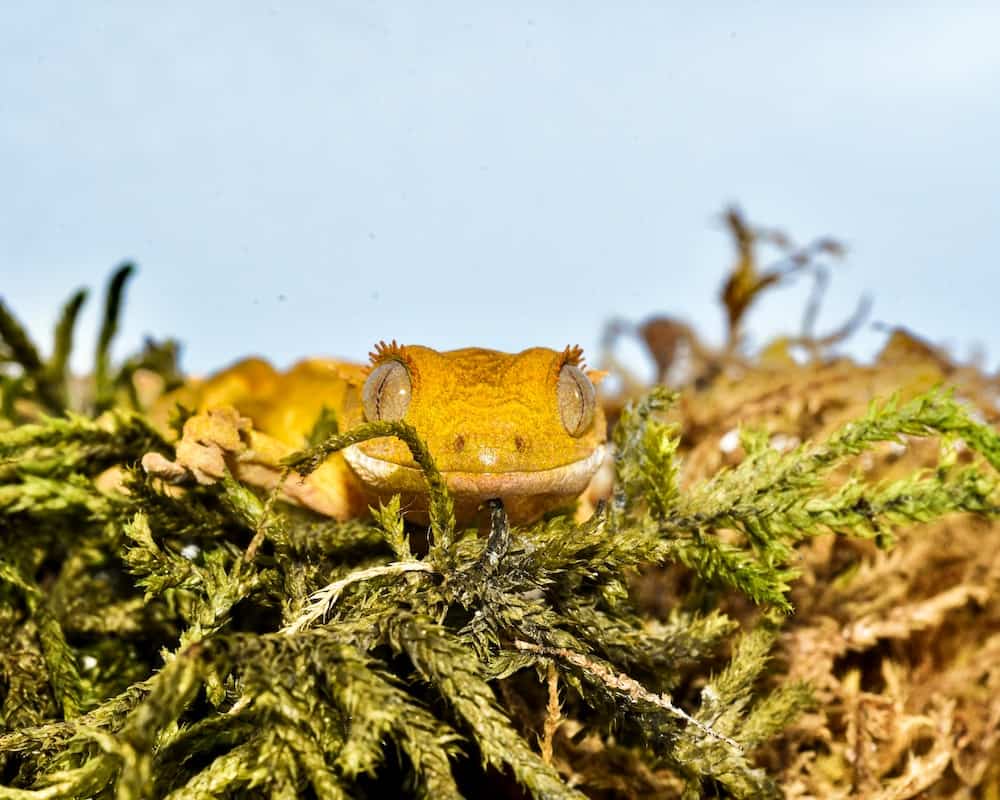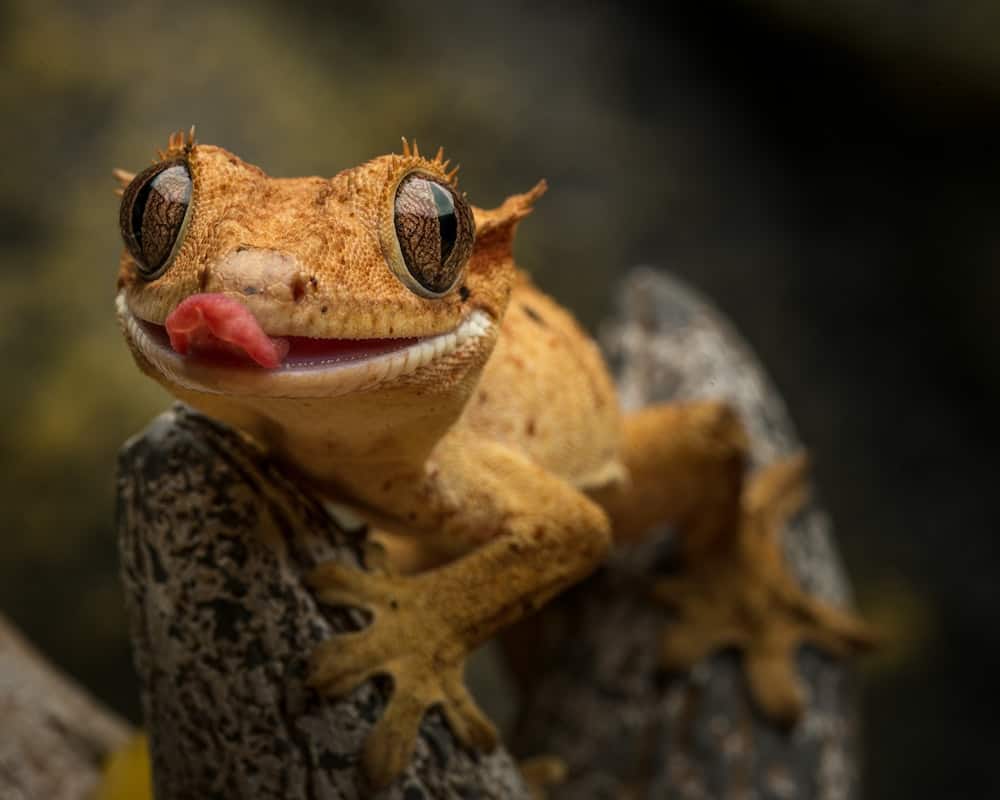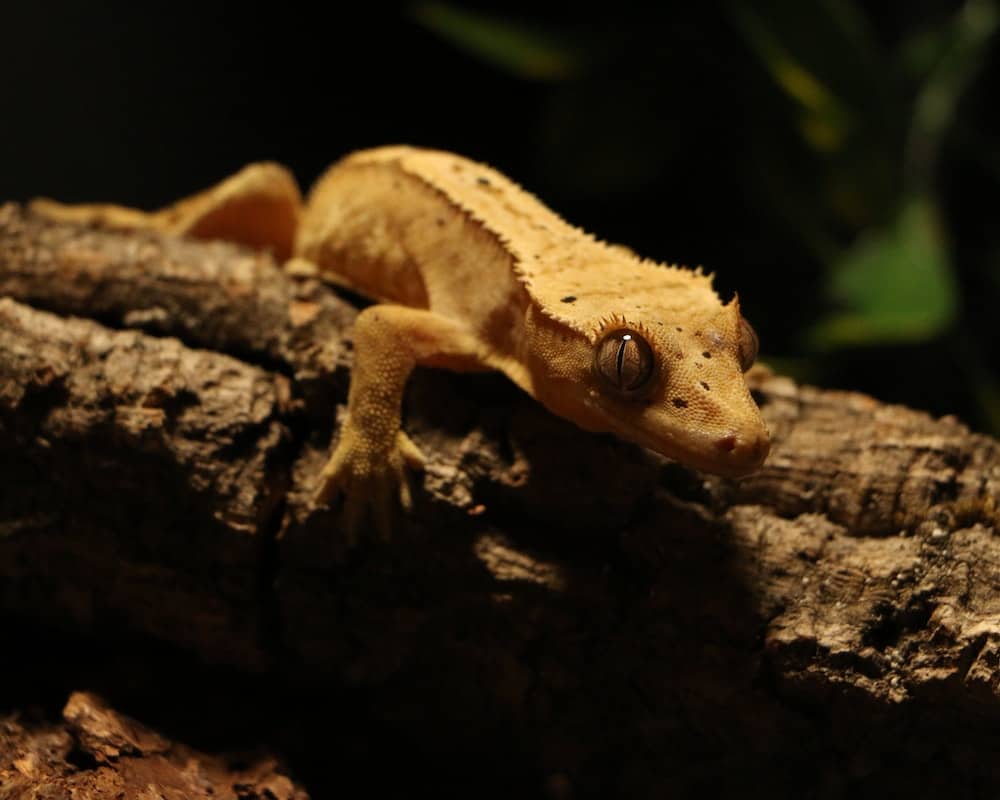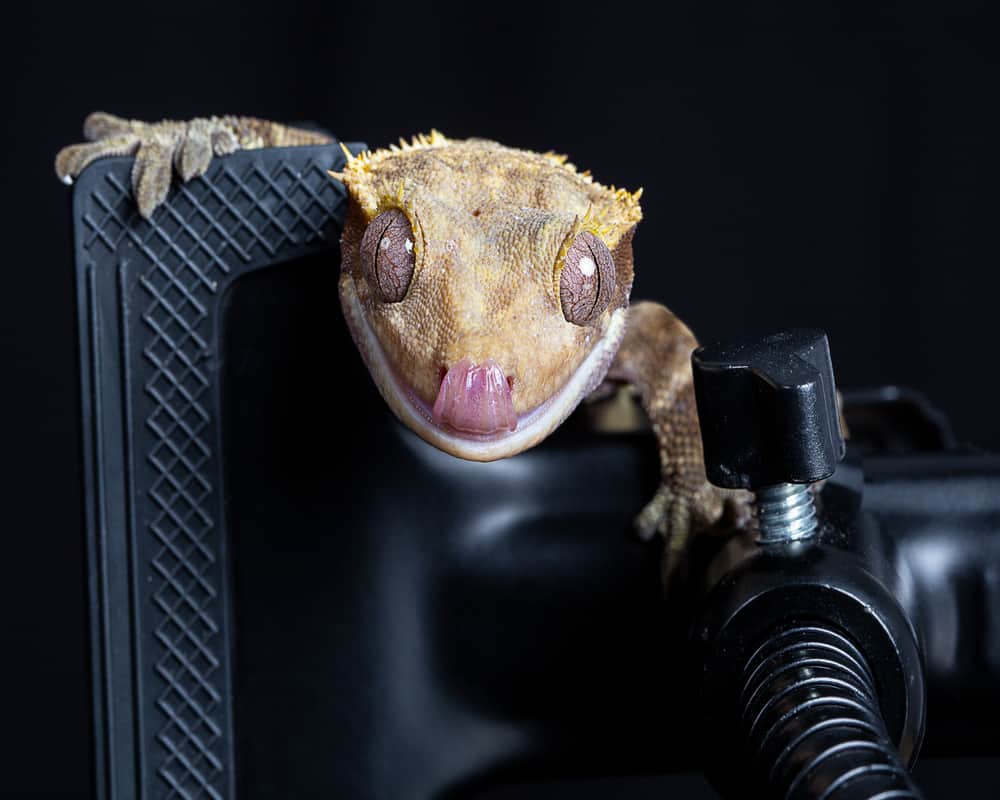The most probable reason why your crested gecko isn’t eating is probably related to an environmental factor or environmental change. However, an inappropriate diet, illness, stress, brumation, dehydration, impaction, and shedding could also be why your crested gecko isn’t eating.
9 Reasons Why Your Crested Gecko is Not Eating
Let us see one by one the reasons why your crestie does not seem interested in eating its food:
- Environmental Factors
The most obvious and primary reason your pet isn’t eating is due to a change in environmental factors or an inappropriate environment.
If your pet is newly brought or you have changed the location of your existing crested gecko, it may take some time for your pet to adjust to its surroundings. Typically it can take a few days or a couple of weeks to get familiar with its environment.
Another environmental factor impacting your pet’s appetite is an incorrect enclosure setup. Things like small tank size, bad ventilation, poor humidity levels, wrong temperature conditions, not providing enough hiding spots, and unhygienic tank conditions can affect the eating habits of your crestie.
- Inappropriate or Invariable Diet
Just as humans get bored of the same diet repeatedly, cresties get bored if you offer them the same food every single day.
If the diet you have been offering to your pet is monotonous and not varied, your crestie may lose interest in eating.
Another cause for loss of appetite is incorrect proportions of food or too much protein in the diet.
A change in food pellets could also be one of the reasons for your crestie losing interest in food.
- Illnesses and Infections
One of the reasons your crestie isn’t eating its food, which needs immediate attention, is the presence of some illness, infection, or parasites.
Cresties find it hard to eat when ill or have some parasitic infection.
When they do not seem to eat for days, it is best to take your crestie to a veterinarian doctor.
- Stress
Your pet may also lose its appetite if it is under a lot of stress. When cresties are under a lot of pressure, they may skip their food and spend a lot of time hiding.
The reasons behind stress could be:
- The presence of your other pets, like cats and dogs, around your crested gecko’s tank
- Too many loud sounds or noises near the enclosure
- Not enough hiding spots
- Inappropriate habitat conditions
If your crested gecko is housed with another crested gecko in the same enclosure, it may induce stress in either or both.
- Bad Oral Hygiene
Tooth decay or mouth rot are signs of infections and bad oral hygiene. If your crested gecko has a dental problem like mouth rot or swollen gums, it will be hard for them to consume any food items.
In the case of dental problems caused by bacterial infections, your pet can lose its appetite.
You need to immediately seek help from a veterinary doctor if this is the reason for losing interest in food.
- Dehydration
Dehydration could be another reason your pet isn’t consuming any food. You can read our Dehydrated Crested Gecko Symptoms article for more information.
If your pet is dehydrated due to lower humidity levels or simply not getting enough fluids, it will become lethargic and might stop eating.
- Shedding
Shedding is a natural but somewhat stressful phase for cresties by which they shed their old skins.
During shedding, your crestie may be stressed out and may lose its appetite. Usually, the loss of appetite, in this case, occurs two-three days before and after shedding.
Your pet might also not seem to eat food during the actual process of shedding.
- Stomach Blockage or Impaction
Suppose your crestie has accidentally ingested a giant or hard-shelled insect or consumed some substrate matter. In that case, it can have its gut or stomach impacted, leading to appetite loss.
This condition needs immediate medical attention.
- Brumation
Lastly, your crestie may enter its brumation or hibernation cycle when the climatic temperature starts getting low.
During brumation, cresties try to preserve their energies. Therefore, they reduce their activities like moving around, eating, and drinking water. This is why your pet may not seem to eat during brumation, usually during winter.
Once the brumation cycle is done, your pet will resume eating and moving around of its own accord.
How Long Can a Gecko Not Eat Without Affecting Its Health?
A crestie can usually go without food for up to 2 weeks without impacting its health. However, it would definitely be best if you started investigating the cause behind why your crestie is refraining from any food; immediately after two days, you start observing this behavior.
What Should I Do to Ensure My Gecko Eats Food?
If your pet is suffering from any illnesses, infections, nausea, dental problems, or gut impaction, it means medical intervention is required.
Do not force your crested gecko to eat any food at such times. It will just further add to their stress. Instead, take them to a vet, and follow the doctor’s treatment.
However, if the loss of appetite or lack of interest in food is caused due to an inappropriate diet or environmental factors, including stress, you might try fixing those.
How Can I Fix My Geckos Diet?
You can start by providing more food items in your cresties diet.
You should include a good range of fruits, vegetables, leafy greens, gut-loaded insects, and pellets.
While offering insects or live food, gut-load them with vital nutrients like calcium, Vitamin D3, and other supplements. This will add to the variety of food and ensure your crestie remains healthy and its immune system stays strong.
Do not overdo the protein or other nutrient content; it can harm your pet.
Also, make sure you do not overfeed your crestie. Overfeeding them will fill their stomach capacities, so they naturally tend not to eat at regular meal times.
How Can I Fix My Pet’s Environment?
You can create a suitable environment for the crested gecko by following the below simple methods:
- Large Terrarium
The first and foremost thing is to provide a spacious and large enough terrarium for your pet.
If the enclosure is too small, your crestie may feel cramped and stressed out, causing it to lose interest in food.
A large enough terrarium will ensure your crested gecko has plenty of space to roam around.
A terrarium of size 5 gallons is recommended for baby cresties and an enclosure of size 20-30 gallons is recommended for adult crested geckos.
- Stress-Free Environment
Below are some simple measures to create a stress-free environment for your pet:
- If you are housing two crested geckos together, separating them into different enclosures is ideal. The presence of another crestie can cause aggression and stress for either or both of them.
- To eliminate another stress factor, ensure your other pets, like cats and dogs, are away from the terrarium where your crestie is housed. The presence of another animal can make a crested gecko feel threatened, thereby increasing its stress.
- Prevent your cat or dog from entering the room where your crestie is housed, or cover the terrarium with a small cover.
- Cutting out any sources of loud noises also helps reduce stress levels in your pet. Make sure the room where your crestie is housed is calm and quiet.
- Also, avoid placing the terrarium near a window. If your crestie spots any bird or animal outside the window, it may perceive it as a threat and get stressed.
- Appropriate Habitat Conditions
If your crestie has recently moved into its new habitat, give it some time to get used to its new habitat.
Along with this, always ensure that the temperature levels are maintained. Too high a temperature will agitate your pet and prevent it from eating any food due to stress, whereas too low a temperature will make it lose its appetite.
Invest in a suitable heating device and thermometer to maintain the correct temperature between 71- 79 degrees Fahrenheit.
Investing in a good hygrometer to maintain the correct humidity levels is advisable.
Along with all the requirements mentioned above, ensure the enclosure has plenty of hiding spots, a good quality substrate, and hygienic tank conditions for creating an optimal enclosure for your pet.
Key Takeaways
Not eating food is sometimes a natural outcome of fixable stress, diet, or environmental factors. Sometimes it is an outcome of naturally occurring processes like shedding or brumation. If repairable, you can try to improve the environmental factors and diet.
However, if the causes are natural, you should let your crestie be. However, in case of a disease or infection, you should immediately get some medical attention for your pet.




